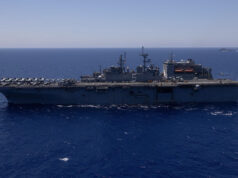Spanish Foreign Minister Alfonso Dastis has said Spain will not seek to regain sovereignty over Gibraltar in Brexit talks.
“I won’t make an agreement between the EU and the United Kingdom conditional on recovering sovereignty over Gibraltar. We will try to convince the Gibraltarians that this is a route worth exploring and that it would benefit them too.”
This comes despite a former Ministry of Defence adviser saying that Royal Navy warships should be sent to Gibraltar to ‘protect it from Spain’ while Britain negotiates a deal to leave the European Union.
Writing in Conservative Homes, Luke Coffey, director of the Allison Center for Foreign Policy Studies said:
“First and foremost, Theresa May, Boris Johnson, Liam Fox, Michael Fallon, and David Davis should make a joint visit to Gibraltar as soon as possible.
The Ministry of Defence should also make a grand gesture by increasing the Royal Navy’s visible presence in Gibraltar. This would send an important message to the Gibraltarians.
The UK needs to prepare for the worse. This could include maintaining a robust air bridge if the land border is closed. Also, in the event of a border closure by Spain, the UK must be prepared to respond with appropriate, firm, and proportionate measures against Madrid.”
The Spanish government had called for joint sovereignty over Gibraltar after the UK decided to leave the European Union.
95.9% of ‘The Rock’s’ 30,000 population voted overwhelmingly for staying in the EU.
Speaking on national radio, Spain’s Foreign Minister said:
“It’s a complete change of outlook that opens up new possibilities on Gibraltar not seen for a very long time. I hope the formula of co-sovereignty – to be clear, the Spanish flag on the Rock – is much closer than before.”
Relations aren’t calm however, in May, a Spanish patrol boat reportedly tried to “hassle” an American nuclear submarine attempting to dock at Gibraltar.
According to multiple sources, flares were fired across the bow of the Spanish Guardia Civil vessel Rio Cedena in mid-April as it twice attempted to sail across the front of the American ballistic missile submarine USS Florida.
The USS Florida, a 20,000 ton Ohio-class ballistic missile submarine, was commissioned in 1983 with the hull designation of SSBN-728; with her conversion to a cruise missile submarine, she was re-designated SSGN-728. She carriers 154 BGM-109 Tomahawk cruise missiles.
The Guardia Civil launch Rio Cedeña attempted to cross in front of the submarine but was stopped by the actions the Royal Navy’s HMS Sabre and a rigid-hulled inflatable boat, which manoeuvred in close, according to an eyewitness as reported by ‘The Chronicle’.











Surely there is space for one of these river class patrol ships to be stationed there permanently.
Very sensible & proportionate
You have to wonder if the King of Spain didn’t go back from his State Visit to the UK, after someone had a word in shell like, and told his Government to stop being idiots and keep their hands off
Spanish Royalty are more politically involved than is UK Monarchy.
Not too interested in the Spanish royalty and what they did or did not do.
Fact of the matter is that Gibraltar was given to the uk as a thankyou gift for the UK supporting Spain in Napoleonic wars.
some 12-15,000 British personnel died fighting in Spain for Spanish freedom from tyranny. At the time Gibraltar was a worthless rock inhabited by smugglers, brigands’ and the odd goat. It is only because the Royal Navy had the vision to realise Gibraltar was a strategic location and the key to controlling the Mediterranean that now Spain want it back. Tough.
a gift once given is given and cannot be taken back. Especially as the United Kingdoms soldiers have spilt blood to earn that gift.
Spain and the EU need to wake upto the fact that we owe them nothing and in fact if any divorce bill is due it is the EU that should be paying us back for the 30+ years of “Harvesting” our budget/ resources and wealth whilst giving us back very little in return other than red tape, autocracy and snide comments.
Glad we are getting out. Our divorce bill should be precisely ZERO £!
Not sure where you studied history mate but Gibraltar was captured in the Spanish war of succession in early 1700’s, then ceded to us in a treaty to end the war, a century before the napoleonic wars.
The West should stick together
A sensible move by Spain. i don’t think the UK would be opposed to giving it back, should the people want it and brexit could encourage that. It’s military importance is now minimal in an era of mid air refuelling and peace in Europe. On the flip side we should not be bullied over brexit or anything else to stop listening to the people and hand it over.
@Steve exactly. The UK has always said that “Gibraltarians’ wishes are paramoun” except that right now they are not where Brexit is concerned. So as you say if Spain is sensible, there is an opening for them to say “come and allow joint sovereignty and there will be massive economic benefits of staying in the EU/cross border investment etc – rather than being forced out of the EU against your will by the Brits”.
There is only an only an outside chance this will work given the current political climate in Gib, but from Madrid’s POV it is the sensible way to go. Whether this WILL happen is another question. Needlessly niggling those on the Rock (as has been happening) is self-defeating. Best Tim
jueves, 10 de agosto de 2017
13:22
Following suit of KieranC’s correct clarification, and chipping in with an alternate description of history:
– Gibraltar was seized for the house of Austria, during the Spanish War of Succession (https://en.wikipedia.org/wiki/War_of_the_Spanish_Succession) by a joint task force commanded by the Prince George of Hesse-Darmstadt, named as viceroy of Catalonia by the Archduke Charles of Hapsburg, after having been crowned as his Catholic Majesty Charles III of Spain on Feb 6th, 1698.
– That it was a battalion of troops from Catalonia that first landed at the foot of the rock, at a place on the east (Mediterranean) coast which, to this very day is still called Catalan Bay.
– That when the troops of the Viceroy of Catalonia took Gibraltar, the above unit, the rest of the allies and the British themselves were fighting in favor and under the flag of the Archduke Charles of the Austrian house of Hapsburg, in defense of the so called Traditional Regime, and against the competing faction headed by Phillipe, Duke of Anjou, but never fighting for Great Britain.
– That once the town and fort capitulated they were handed over on Aug. 4th by the Spanish governor, who represented the Bourbon side, to the Príncipe de Hesse-Darmstad, and not to Great Britain.
– That only a couple of days after the capture of Gibraltar, when Prince George of Hesse-Darmstadt set sail for Barcelona he appointed Major-General Henry Nugent (https://en.wikipedia.org/wiki/Henry_Nugent) as Governor of Gibraltar on August 6th, 1704. Henry Nugent, Count of Valdesoto and vice-count of Collambres, was Irish and, as a Roman Catholic, could not hold the Queen’s commission in the British Army, but he received lightning promotion as a major-general in the hardly-existent Spanish army of the Pretender Charles III.
– That Major General Henry Nugent died on Nov 9th, 1704, during the 12th siege of Gibraltar (https://en.wikipedia.org/wiki/Twelfth_Siege_of_Gibraltar) by the Bourbon side, and again, Spanish not British, Major-General Ramos was appointed governor of Gibraltar after Nugent’s death, around August 1705, this time by Archduke Charles himself, the very leader of the Austracist cause and still legal owner of the position under the then applicable right-of-war (https://gibraltar-intro.blogspot.com.es/2016/05/1705-general-ramos-gobernador-de.html).
– That frictions which had already been present prior to Nugent’s appointment increased, all in a context of a small Spanish garrison of troops from Catalonia and general duress, gradually resulted in degradation of the chain of command in between Major-General Ramos and the British garrison commanded by Major-General John Shrimpton (https://en.wikipedia.org/wiki/John_Shrimpton), as direct commander of the majority of forces inside Gibraltar. Chances are that a recommendation that a majority of the garrison be made up mostly just by British troops previously made by Great Britain’s ambassador to Portugal, John Methuen, was part of a wider policy to exploit was was perceived as a great opportunity for windfall gains. https://en.wikipedia.org/wiki/Capture_of_Gibraltar%23cite_ref-trevelyan414_30-0
(https://en.wikipedia.org/wiki/John_Methuen_(diplomat))
– The stage was then deemed to be set and on April 1706, less than 2 years after the capture of Gibraltar, and still five years (59 to 60 months) away from signature of the Treaty of Utrecht, then Colonel Roger Elliott received a special order from Queen Anne, instructing that Gibraltar be made a free port where he was “not to permit any duty or disposition whatsoever to be laid or received for any ship or any vessel … imported or exported out of this port”. Let me highlight that these were British instructions bearing directly square on aspects of sovereignty (i.e. policy for customs and trade), parallel to the still official and legal chain of command, which was still defined by the Austracist side, not by Britain.
(https://books.google.es/books?id=yT4OAAAAQAAJ&pg=PA16… ).
– The break in command became definitive once the Major-General Ramos was dislodged (forcefully ousted?), and Queen Anne unilaterally appoints Major-General Roger Elliott as Governor of Gibraltar on Dec 24th, 1707, again without documented approval of any Austracist chain of command
The new status quo was eventually formalized by the Treaty of Utrecht 1713, under which the French branch of the Bourbon Dinasty, and to a large extent the King Phillip III, as the newly established Spanish branch preferred peace and acceded to the terms of the treaty and, in particular, article X.